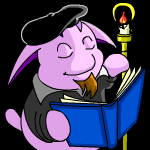The Hopeless Incompetent's Guide to the Poetry Contest by zammm2000 |  |
OH DEEP CATACOMBS - Do you not know what a rhyme is? Do you think it's a river
in Europe? Does the word alliteration strike fear into your heart? Do you wake
up each morning in mortal fear of the Earth being invaded by couplets and limericks
marching in iambic pentameter?
Do you know what any of these terms mean? If not, then you, my friend, are
poetically challenged. And no, you're not alone; it's a common complaint.
What on earth, you ask, does poetically challenged mean? Don't bother looking
in the dictionary for it, it's a term I made up. It means someone who has trouble
creating poetry.
Amateur Poetry, of course, usually consists only of rhymes, while the poems
created by professionals are quite literally works of art. Poetry can be anywhere
between as simple as the ever present 'Roses are red, / Violets are Blue, /…'
rhyme of childhood to as complex the wonderful works of such famous authors
as Shakespeare and William Blake.
To see a world in a grain of sand,
And a heaven in a wild flower;
Hold infinity in the palm of your hand,
And eternity in an hour.
-William Blake
If you are poetically challenged in any way, or if you just want a refresher
course on the basics of poetry, then this is the guide for you.
Types of poems
Right now, you're probably thinking something along the lines of, "What?!
Poetry's Poetry, isn't it?". Well, you're right, but there are more types
of poetry than you could imagine. Limericks, Couplets, Sonnets, Haiku, Ballads;
Poetry and poems come in many guises. Even songs (for the most part) are just
poetry put to music. Here I will describe to you some of the more popular types
of poems, and describe how to create them.
Basic Rhymes
These are one of the most basic poem types in existence. They can be any length,
from two lines to five hundred or more. The idea of the rhyme is that the last
few syllables a particular pattern of lines rhymes, and so does the next pattern,
et cetera. The majority of poems entered in the poetry contest are these. There
are lots of variations, and the only general rule is that the cadence, or beat,
must be similar. This means that they must be said with a certain rhythm to
achieve full effect. This makes sense, otherwise we'd have poems running like:
I love you with all of my heart,
And I absolutely, positively cannot possibly bear even the thought of anything
that could possibly come between us and make us part.
See what I mean about beat? All poems have some form of it, otherwise they
don't sound right. Some poem types even have a special rhythm all their own…
Limericks
One of the best --and most well known-- rhyming poems is the Limerick. Limericks
have a very strict beat and rhyme, and so are devilishly hard to make. The first
line rhymes with the second, and both of these with the fifth, while the third
rhymes only with the fourth. It has 7 beats in the first line, 7 in the second,
6 in the third, and 6 and 9 for the fourth and fifth, respectively. When said
to the correct beat, they sound like a miniature song. Limericks are usually
humorous, and often involve puns and other plays-on-words, as in my personal
favourite:
There was an old lady of Rhyde,
Who ate eighty apples and died.
The apples fermented
Inside the lamented,
Making cider inside her inside.
See what I mean about beat? It must be spoken with a distinct pattern to sound
it's best. But now I've rambled on too long, and we'll have to gently skim the
other sections. You probably won't use them, but you never know.
Haiku
Haiku are of Hawaiian (or maybe Oriental… I can't remember.) origin, and
are just as strict as limericks. Though they do not have to rhyme at all, they
must consist of three lines, each with exactly the right number of syllables.
Five syllables each to the first and last lines, and seven syllables for the
second. They are short, sweet, and, when done properly, wonderfully evocative.
Initial Letter Poetry
This type of poetry is extraordinarily easy to make if you do it right, but
if you do it wrong, it will keep you awake for hours. The whole idea is that
the first letter of each of the lines, when read from top to bottom, gives a
particular pattern of letters. This can be anything from the alphabet to Mary
Poppins' famous made-up word supercalifragilisticexpialidocious. They don't
have to rhyme, each line can be as long as you like, and the poem as long as
your stamina and the reader's mental stability allows.
Freestyle Poetry
This is pure, unrestrained poetry, completely without rules or regulations.
You can do whatever you like, but it should be at the very least somewhat poetic.
Don't write a story; that's prose. Prose is not freestyle poetry. Use lots of
flowery language, symbolism, comparison, and similar devices, and you should
do fine.
And that's all you need to know about Poetry; at least as it applies to the
Poetry Contest. If you have any questions or comments, feel free to Neomail
me.
Remember, if you can think, you are capable of creating poetry, and everyone
can think. Your first poems might not be very good, but you should try anyway.
With practice, you could be a regular winner of the Poetry Contest! Happy Composing!
|
![]()
![]()